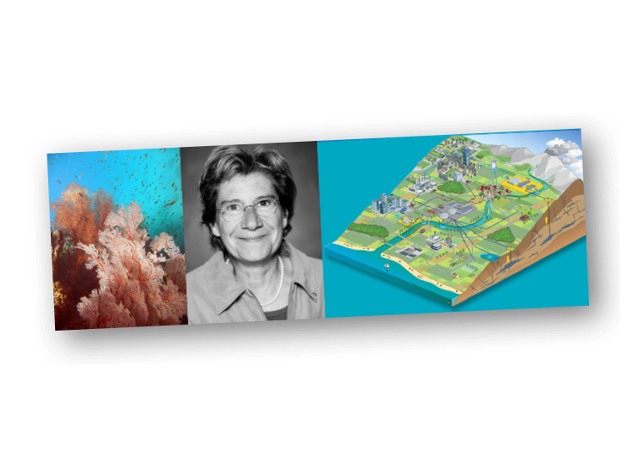‘All too often, we forget that everything we produce and/or consume sooner or later ends up in the ocean…’

Today, over 50% of the world’s population lives less than 50km from the coast. The environmental and human impacts are far-reaching. ‘Coastalization’ is escalating worldwide. Marie Christine Huau*, member of the Foundation’s Board of Experts, explains the mechanisms involved, the issues at stake and the merits of integrated management of coastal areas.
What do you mean by integrated management of coastal areas?
I mean a global approach that creates synergy, applying all the data for a given area to the coast, at the land-sea interface. All too often, we only consider the sea from a landward perspective. Sailors are well aware of the difference in viewpoint when they approach the coast from the sea.
A paradigm shift is needed to save our coasts and our coastlines. Integrated management is a systemic, cross-disciplinary approach that enables consistent and sustainable measures to be taken that are both preventive and reactive to point and non-point sources of pollution. Everything is connected. We know, for example, that overexploitation of groundwater resources in coastal areas leads to saltwater intrusion into aquifers. This not only reduces the supply of water for drinking and crop irrigation but increases the risk of soil infertility. It is the whole area, therefore, that is affected. Nor can we sustainably conserve an area’s biodiversity unless we also focus on anticipating the effects of climate change (storms, floods, drought, etc.) and take into account land-based and anthropogenic phenomena at the local and regional level. Everything is interrelated.
What ‘virtuous’ economic model do you advocate?
Here, too, a paradigm shift is required. We need to lay the foundations for a circular economy and, in our actions, make the link between land and sea. The earth-sea interface is a key element for the future of the planet. It is there that all the tensions are rising and risks increasing; it is there that the population is moving… The coastline is a vital issue. To take the example of garbage, 80% ends up in the ocean. There is a seventh ‘continent’ of plastic waste in the sea, contaminating numerous marine species, some of which become part of our food intake via the ocean food chain. And yet no economic model has been developed to deal with this scourge. We are just beginning to say that plastic should be banned from manufacturing, with an impact several years in the future. Similarly, unless we create new options to decarbonize our economy, how will we be able to combat climate change and its impacts? Today, the ocean acts like a sponge. But for how long? That our planet is finite is self-evident. We urgently need to shift towards systemic approaches that consider territories as a whole, and to encourage medium-term and long-term policies. As all this will, of course, take time: five to ten years. One of my roles as an expert and development specialist is to show clearly that investments made today will pay off in the years to come, promoting autonomy and sustainability.
Examples from integrated water resources management indicate that scarcity is the key factor in mobilizing action…
Yes, that is often the case, as in Morocco. Wastewater there is now collected, treated and partly reused for landscape irrigation and for irrigating golf courses, for example, at seaside resorts. Coastal waters once again meet health and safety standards and are clean enough to swim in, much to the pride of the Government. At the Marrakech Climate Change Conference in 2016, alongside HSH Prince Albert II of Monaco and French Environment Minister Ségolène Royal, the Moroccan Environment Minister expressed her satisfaction at reconciling urban and economic development with conservation of the coastal environment. Mention can also be made of certain regions in Namibia, where drinking water comes mainly from recycling of wastewater, thanks to a high performance treatment process. The experience of Monaco is also noteworthy: 17% of the energy produced by the Principality is supplied by seawater heat pump technology, harnessing the thermal energy of the sea, which is local, sustainable and carbon-free. A structure has been put in place that respects the biodiversity of the surrounding marine environment. All these initiatives support biodiversity. Human beings must live as part of nature, rather than alongside it.
You have been a member of the Board of Experts since the Foundation was set up. What does that mean to you?
The opportunity of sharing with a network of experts the passions and expertise each of us brings, and the hope that, together, we can make things ‘better’. I firmly believe that it is not enough to be an expert only in one field. There are initiatives we would never have got involved in had we not compared ideas on achieving a common goal. It is by sharing expertise that we move forward. For me, the word ‘interface’ is at the heart of how we address key issues for the future: the earth-sea interface, the interface of knowledge sharing and the generational interface so that we can build our future together. I also appreciate the Foundation’s methodology: each project is assessed in the light of our different perceptions, from its conception to its implementation on the ground. I am delighted that the Foundation has chosen to deepen and consolidate its work in a limited number of sectors and countries rather than spreading itself too thinly. In this way, the Foundation has created its own unique place among both the already sizeable development community and the beneficiaries on the ground. Its actions are recognized and appreciated. It gives me real satisfaction to make my own contribution!
* Biography
Member of the Foundation’s Board of Experts since its establishment in 2004, Marie Christine Huau is a water and environmental management specialist. An agronomist, coastal oceanography and marine biodiversity expert, since 2007 she has been leading innovative development projects in the field of water resource and water cycle management for Veolia.
